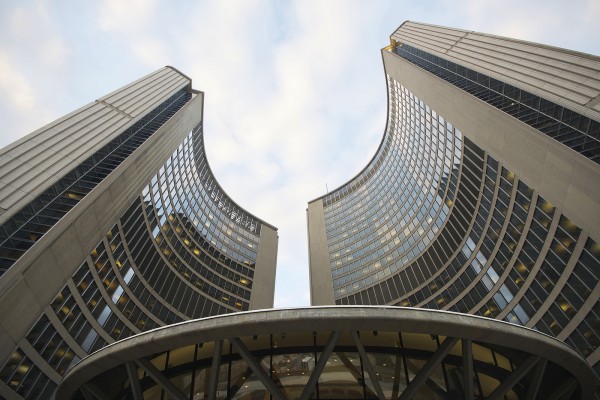Mayor Rob Ford, according to The Globe and Mail, racked up over $116,000 in legal fees fighting the conflict of interest allegation, and it appears that he is determined to make Paul Magder, the complainant, pick up this bracing tab.
Should Ford be expected to personally cover the cost of defending himself in a legal battle in which he ultimately prevailed?
No. A panel of three judges scrutinized the lower court’s original decision, heard the arguments from two nuclear-powered lawyers, and ultimately ruled that the mayor did not breach the municipal conflict laws last February. I can’t think of any reason why it would be fair that he get stuck with those legal bills.
True, he has not been held accountable for the original code of conduct breach (asking developers and lobbyists to contribute to his family’s football foundation), which was a much more serious abdication of his professional duties than voting on a motion to erase the $3,150 fine imposed by integrity commissioner Janet Leiper. But a hefty legal bill for the conflict case can’t be seen — and shouldn’t be seen — as a de facto penalty. He won, and so he shouldn’t have to pay.
Ford, however, clearly intends to pursue Magder for those costs as an ice-water warning to others who might be considering this kind of action against him. And that raises the question of whether Magder should shoulder this financial hit.
While Magder assumed a risk in pursuing this case — just as Adam Chaleff-Freudenthaler and Max Reed could be facing equally steep penalties if council’s compliance audit committee decides not to press charges against him this afternoon — it seems to me that the City should pick up part of the cost of Ford’s legal bills.
After all, the conflict case arose as a result of Leiper’s original investigation into the football foundation donations. As integrity commissioner, she is acting on behalf of council (and therefore Torontonians), and uses the financial resources of the City of Toronto to carry out her mandate. If she hadn’t pursued the original complaint and the subsequent follow up, there would have been no conflict case.
But I don’t think the City should cover the entire bill. Rather, the City and Magder should split the cost.
Why?
Ford is well versed in the politics of pay-back, and evidently intends to dispense some in this case. So from where I sit, anything that dials down the retributive fever that has gripped council since the day he took office is a good thing.
At the same time, one of the shortcomings of the whole complaint edifice – the code of conduct, the compliance audit provisions of the Municipal Elections Act, and the Conflict of Interest penalties – is that it has the capacity to infect our political system with litigious fervour.
I’m not saying this category of legislation is unnecessary. But these rules are vulnerable to misuse, and I think it’s become increasingly clear that the pursuit of the conflict allegation against Ford was ill-considered and over-sold from the get-go.
For that reason, I’d say there’s an argument for expecting Magder and his supporters to shoulder part of the load. I’m guessing that raising $58,000 from the mayor’s many political opponents won’t prove too difficult.
Splitting the difference — which requires council to rescind a by-law passed early in Ford’s term banning the city from picking up councillor’s legal bills — would send several signals: first, that vengeance in either direction is not a healthy way to conduct politics; second, that the moral hazard associated with vexatious litigation is real; third, that council and the city’s taxpayers properly bear some of the financial responsibility for this mess; fourth, that the threat of legal fees shouldn’t cast a chill over the system designed to handle complaints against politicians.
To get there, two-thirds of council would have to back a motion to re-open the legal fees policy. It is an open question whether the mayor could be persuaded, much less compelled, to stand down from his determination to force Magder to pay. But if council can back a compromise crafted to de-escalate of the brinksmanship that continues to pollute the city’s politics, it should take every opportunity.
As your mother used to say, two wrongs don’t make a right.
photo by Andreas Garcia






5 comments
Well put. I agree that a split between the city and Mr. Magder would be both fair and appropriate.
NB. Mayor Ford’s conduct breach was not “asking developers and lobbyists to contribute to his family’s football foundation”. The Mayor and any all Councillors are free to solicit or fund raise on behalf of charities. What made Ford’s action a conflict (in the opinion of the Integrity Commissioner) was his use of his office letterhead. If he had made the requests on his personal letterhead this would be a non issue.
This isn’t a topic I have thought about on detail, but I do think Ford should cover some costs as well. This was hardly a frivolous lawsuit, and the only reason he won was based on a technicality of a poorly written law. He made the choice to hire a top tier lawyer, and he made the choice to appeal.
I think at the very least, Ford should cover his own fees for the initial trial which he was found guilty. After that, we can figure out who is on the hook for the appeal.
Rob Ford seems to be forgetting that he got himself into this mess in the first place. While Council apparently didn’t have the authority to impose the punishment they did, they could have suspended him from Council for a period of time (and thus cause him a financial penalty.) If so then the issue would not have come up for a second time-which is when the (assumed) conflict of interest issue arose. Mr. Magder (and others) were correct in assuming a conflict of interest so he should not be penalized for pursuing the action. It was Council that was apparently wrong in imposing a certain type of penalty. So if Rob Ford is to recover his legal costs to date it should not be from Mr. Magder. Of course, he also could have raised the nullity issue earlier so that many of the legal costs would not have been incurred
“I think it’s become increasingly clear that the pursuit of the conflict allegation against Ford was ill-considered and over-sold from the get-go.”
How is it becoming increasingly clear exactly? Just because Ford was granted the decision on appeal does not mean hs should be exhonerated. The decision of the appellate judges found he was guilty of breaching conflict of interest, and rejected all his defences; he was only found not-guilty because Council levied a ‘punishment’, which the judges interpreted that was ultra vires vis a vis the COTA and MCIA, rather than a fine or suspension of pay, which would have been legal.
I understand the need to draw closure to this prolonged period of litigation for the good of the city, and am prepared to do so. But it’s going to be difficult to carry out if Ford’s behaviour is going to be whitewashed, and if the honest attempts to get our municipal officials to behave are termed “ill-considered”.
I see Adam Chaleff Freudenthaler is 3 and 0 now (he has lost all three
cases against Ford.
He and his friend Max Reed are not taking interviews, and are very quiet about this
whole thing. guess they are thinking about the Ford legal bills about to crash down hard on them. Mayor Ford has every right to get the best possible defense, Mr. Chaleff Freudenthaler is not a person to take litely .
I hate to see how much the taxpayers will (or will not) pay after the dust settles.